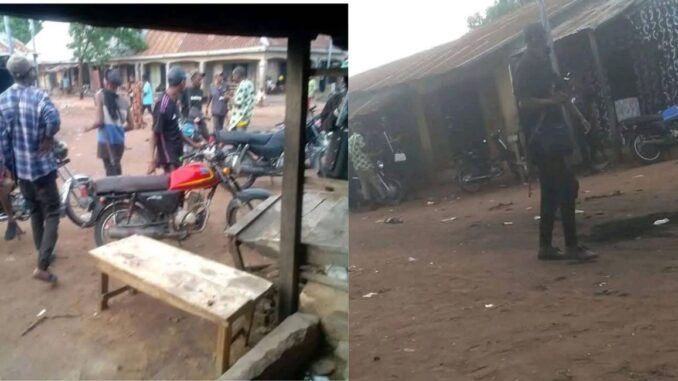News
Senate to stop enforcement of electrical standards by states

The National Assembly has hinted at its plans to amend the 2023 Electricity Act.
It said the amended act will seek to recognise the Nigerian Electricity Management Services Agency as the sole regulatory agency to enforce technical standards and regulations in the power sector.
The Chairman, Senate Committee on Power, Eyinnaya Abaribe, disclosed this plan at the fourth Edition of The Stakeholders Roundtable for the Enforcement of Technical Standards, Regulations, and Mandates held on Tuesday in Abuja.
Recall that last year, President Bola Tinubu assented to the 2023 Electricity Act as a replacement for the Electricity and Power Sector Reform Act of 2005.
The act approved the de-monopolization of Nigeria’s electricity generation, transmission, and distribution of electricity at the National level and empowered states, companies, and individuals to generate, transmit and distribute electricity.
It also enabled the states to issue licenses to private investors who can operate mini-grids and power plants.
However, against the law, some states approved the establishment of technical and safety standards carrying out technical enforcement in NEMSA’s areas of specialisation.
But speaking in his goodwill address, the senator representing Abia South, said the amended law will explicitly prevent states from enforcing technical standards.
He stated that the 2023 Electricity Act (2023 EA) does not grant states the authority to enforce technical electricity standards.
Abaribe stressed the need for federal law to supersede state law in this area, warning that a clear legal framework is necessary to prevent individuals from arbitrarily setting technical standards.
He said, “The national assembly wants things to be better in the power sector and I don’t think any Nigerian would be very happy with the power sector as it is.
“It’s our pleasure to be here at this critical roundtable that is focused on optimizing executive, legislative and judicial rule in enforcing technical standards and regulations in the power sector. This roundtable has been organized by NEMSA at a time when the use of substandard and very inadequate electrical equipment is considered one of the major culprits for frequent grid collapse in Nigeria.
“But I think to answer the issues, there is nowhere in that law that gives states the right to enforce standards of our electrical equipment, supplies, and everything. There is none.
“And so we think that, and I think we discussed it with the legal community last time, that we may need to, in trying to amend the 2023 electricity act, make it far more explicit that just like the Nigerian Electricity Regulatory Commission, that for a question of safety, Nigeria must have one standard. We cannot have multiple standards and NEMSA will be in charge.”
He further said with the decentralization of electricity regulatory responsibilities ushered in by the enactment of the Constitution of the Federal Republic of Nigeria, 1999 (Fifth Alteration) (No.17) Act and the Electricity Act, 2023, the challenge of enforcing electrical standards and safety at the sub-national levels of Government may even become more daunting for NEMSA.
“And so to make sure that state government don’t mischievously go to set up their standards and then we have a conflict, we will make sure that it will be stated explicitly in the law. And as you know, it’s an idea that a federal law would often supersede a state law.
“The centralisation of the regulatory responsibilities that were ushered in through the enactment of the Constitution of the Republic of Nigeria in 1999 and the Electricity Act now poses a big challenge to everyone, and especially NEMSA.
“What is the nexus between you and the standard organizations of Nigeria? But we already continue having all these types of issues, and I think that this roundtable should focus and look at how we can actively contribute our insights into how to make sure that everyone will adopt a particular standard,” he added.
Abaribe said that given the enormity of NEMSA’s mandate in enforcing electrical standards and ensuring safety in the NESI, the regulator, contractors, operators/licensees, customers and other critical stakeholders need to support NEMSA to deliver on this mandate, hence the justification for this multi-stakeholder roundtable.
The Senator also promised strict regulatory oversight to ensure the implementation of safety measures in the sector.
In his welcome remarks, the NEMSA Managing Director, Aliyu Tahir highlighted the indispensable role of the legislative and judicial arms in shaping and upholding regulatory frameworks for the Nigerian Electricity Supply Industry.
He emphasized that NEMSA’s core mandate, established under the NEMSA Act 2015 and the Electricity Act 2023, revolves around enforcing technical standards, inspecting and certifying electrical installations, and ensuring the safety of lives and property.
“Our mission is to guarantee that electrical materials, equipment, and installations meet the required quality, standards, and specifications to deliver safe and sustainable electricity across Nigeria,” Engr. Tahir stated.
Tahir stressed that robust legislative oversight, judicial interpretation, and stakeholder engagement are critical to addressing the proliferation of substandard electrical materials and ensuring compliance across the power sector.
“The safety of lives and property within grid and off-grid networks hinges on strict adherence to technical standards,” he noted.
He also called for active participation and innovative contributions from attendees to resolve legal and regulatory challenges impeding progress in the sector.
This event reaffirmed NEMSA’s commitment to maintaining the highest safety and technical integrity standards while ensuring a reliable electricity supply for all Nigerians.
“Together, we can build a safer and more resilient electricity industry,” Engr. Tahir concluded, expressing gratitude for the ongoing support of the Legislature and Judiciary.
News
Reps Tackle CBN, OAGF Over Missing Grants, Bailout Funds

According to him, such financial mishandling not only disrupts critical public services and projects but also results in major losses to the nation’s purse—resources that could have been channelled into crucial services and developmental efforts, as laid out in Section 14(2)(b) of the Constitution.
Speaker Abbas, thereafter setup a Special Committee to be chaired by Rep. Chinedu Martins to immediately launch a probe into the “Utilisation of take-off grants, bailout funds, and interventions allocated to MDAs, government institutions, and GOEs from 2015 to present.”
News
Abuja light rail project must be commissioned on May 29-Wike vows

The FCT Minister, Mr. Nyesom Wike, expressed satisfaction with the progress on the Abuja light rail project, reaffirming its May 29 delivery as sacrosanct.
He made these assurances after inspecting the ongoing construction of access roads to the train stations on Wednesday, from Metro Train Station in the Central Area to Nnamdi Azikiwe International Airport, Abuja.
Reassuring journalists accompanying him, the minister reiterated that President Bola Tinubu would commission the rail project on May 29 to mark his second year in office.
The visited stations were Wupa station near Idu and Bassanjiwa station near the airport.
“This is part of our routine inspection of ongoing projects to see the contractors’ progress,” Wike explained.
“We are working day and night to fulfill our promise to President Tinubu and FCT residents. By May, Mr. President will ride on the Metro line.”
News
Just in: Alleged Herdsmen Armed With AK-47 Rifles Take Over Communities In Benue State

Gunmen suspected to be Fulani herdsmen are currently invading some communities in the Ukum Local Government Area of Benue State.
According to sources, the herdsmen armed with AK-47 rifles stormed the community around 04:15pm on Thursday.
“Our lives are in danger this evening, armed Fulani herdsmen, about 600 in numbers have taken over our communities this evening,” a resident told SaharaReporters.
“They’re currently moving around towns in Ukum Local Government Area of Benue state. No security personnel at all, Governor Alia didn’t send security, they said operation will start soon once they (herders) have observed the place.”
The insecurity situation in Benue has been alarming in recent weeks with attacks from gunmen suspected to be herdsmen.
The media had reported that suspected herdsmen again unleashed terror in Benue State, attacking three communities in Otukpo Local Government Area (LGA) on Wednesday, just a day after 11 people were killed in a deadly raid on Otobi community.
The latest victims of the escalating violence were Emichi, Odudaje, and Okpamaju, communities that had previously suffered an attack in February, which left five people dead.
However, the renewed attack has created fear and mass displacement among residents, with women and children fleeing to safety.
Local sources say the death toll from the fresh attack remains unclear, but several casualties are feared.
-

 News7 hours ago
News7 hours agoBREAKING: Unknown gunmen reportedly storm Senator Natasha’s family residence
-

 News10 hours ago
News10 hours agoSnub story on removal of Rivers Sole Administrator, it’s FAKE-Chief Registrar
-

 News16 hours ago
News16 hours ago“How my father escaped assassination” – Bishop Oyedepo’s daughter
-

 News16 hours ago
News16 hours agoFG expresses sympathy for CBEX victims, urges a united effort to combat Ponzi schemes
-

 News9 hours ago
News9 hours agoSAD! Again, Alleged Herdsmen Attack Three Benue Communities
-

 Politics9 hours ago
Politics9 hours agoPDP govs are jokers, can’t stop coalition train, Atiku boasts
-

 News22 hours ago
News22 hours agoEl-Rufai labels Tinubu’s government ‘worst in Nigeria’s history’
-

 News16 hours ago
News16 hours agoWoman tragically lost her life after attempting to flee through glass door during alleged incident of domestic violence


















